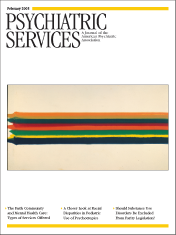To the Editor: Despite scientific reports that lunar phases are not associated with increased visits to general or psychiatric emergency departments (
1), emergency staff still mutter "must be a full moon" on certain busy nights. Overnight psychiatry house staff are particularly vexed by this age-old folkloric association, and some cringe at working on full-moon nights. Thus we decided to examine our experience with this popular myth.
We examined psychiatric emergency department visits to our tertiary referral center from January 1, 1997, to December 31, 2001. We included patients seen for primary and secondary psychiatric reasons and counted only patients who registered between 6:00 p.m. and 6:00 a.m. We reasoned that this 12-hour period captured a majority of the night when the full moon would have been visible.
The Web site of the United States Naval Observatory (http://tycho.usno.navy.mil/time.html) was used to calculate the dates of the full moon for our geographic location. We defined the "full-moon effect" to occur over a three-day period but only from 6:00 p.m. to 6:00 a.m. For example, for the full moon of January 23, 1997, we considered the full-moon effect to occur on the nights of January 22, 23, and 24.
For the five-year investigation period, there were 1,826 nights, of which 186 fit our definition of the full-moon effect. On those nights, a mean±SD of 2.30±1.7 patients were seen, compared with a mean of 2.32±1.56 on nights when the moon was not full. A two-sample unequal variance t test showed no significant difference between the numbers of patients seen on full-moon and non-full-moon nights.
Our finding agrees with those of other studies that showed no association between the full moon and increased patient contacts. These studies varied in samples and methods—some counted crisis center telephone calls (
2), and others counted the full moon's effects in terms of days or quarters (
3). Our study focused on overnight patient contacts in a psychiatric emergency department and a three-night full-moon effect. We did not control for potentially confounding variables such as day of the week, month, year, weekend, holiday, or cloudy night.
The literature on the full moon and psychiatric symptoms includes many enlightening articles. Raison and colleagues (
4) suggested that sleep deprivation from lunar luminescence in premodern days may have caused psychopathology, giving rise to the myth about the full moon. Myers (
5) used
reductio ad absurdum to suggest that the purported effects of a full moon should also occur during the new moon and high tides because of gravity. He also noted that most of the positive associations found in studies of the effects of the full moon have statistical and design flaws. Both Raison and colleagues and Myers disputed any association in modern times between the full moon and insanity. Our findings do not support such an association either.

